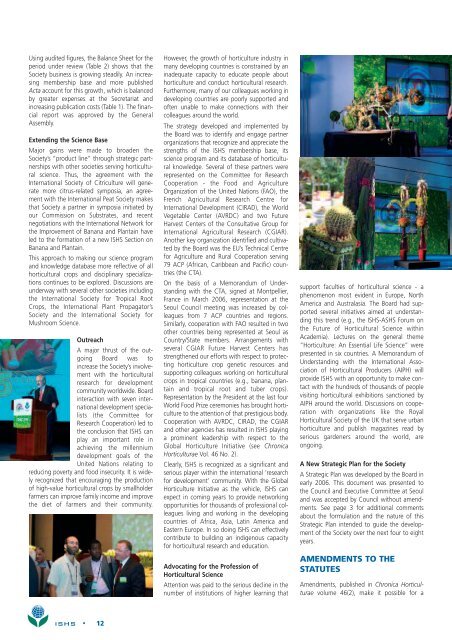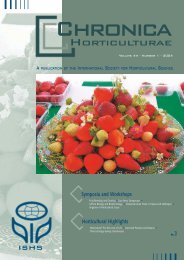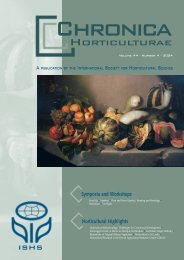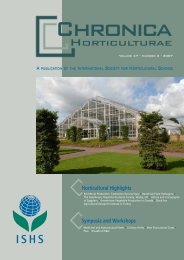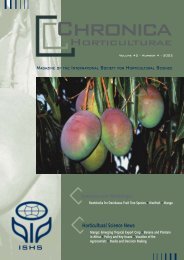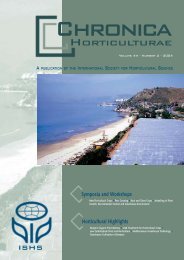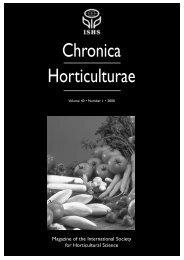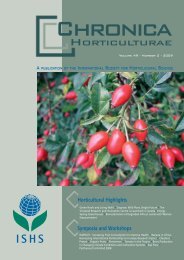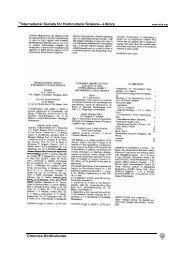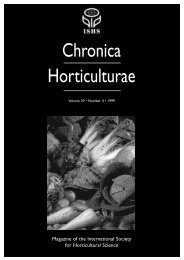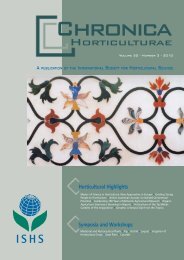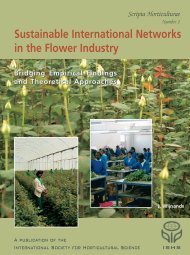Acta Horticulturae
Acta Horticulturae
Acta Horticulturae
Create successful ePaper yourself
Turn your PDF publications into a flip-book with our unique Google optimized e-Paper software.
Using audited figures, the Balance Sheet for the<br />
period under review (Table 2) shows that the<br />
Society business is growing steadily. An increasing<br />
membership base and more published<br />
<strong>Acta</strong> account for this growth, which is balanced<br />
by greater expenses at the Secretariat and<br />
increasing publication costs (Table 1). The financial<br />
report was approved by the General<br />
Assembly.<br />
Extending the Science Base<br />
Major gains were made to broaden the<br />
Society’s “product line” through strategic partnerships<br />
with other societies serving horticultural<br />
science. Thus, the agreement with the<br />
International Society of Citriculture will generate<br />
more citrus-related symposia, an agreement<br />
with the International Peat Society makes<br />
that Society a partner in symposia initiated by<br />
our Commission on Substrates, and recent<br />
negotiations with the International Network for<br />
the Improvement of Banana and Plantain have<br />
led to the formation of a new ISHS Section on<br />
Banana and Plantain.<br />
This approach to making our science program<br />
and knowledge database more reflective of all<br />
horticultural crops and disciplinary specializations<br />
continues to be explored. Discussions are<br />
underway with several other societies including<br />
the International Society for Tropical Root<br />
Crops, the International Plant Propagator’s<br />
Society and the International Society for<br />
Mushroom Science.<br />
Outreach<br />
A major thrust of the outgoing<br />
Board was to<br />
increase the Society’s involvement<br />
with the horticultural<br />
research for development<br />
community worldwide. Board<br />
interaction with seven international<br />
development specialists<br />
(the Committee for<br />
Research Cooperation) led to<br />
the conclusion that ISHS can<br />
play an important role in<br />
achieving the millennium<br />
development goals of the<br />
United Nations relating to<br />
reducing poverty and food insecurity. It is widely<br />
recognized that encouraging the production<br />
of high-value horticultural crops by smallholder<br />
farmers can improve family income and improve<br />
the diet of farmers and their community.<br />
However, the growth of horticulture industry in<br />
many developing countries is constrained by an<br />
inadequate capacity to educate people about<br />
horticulture and conduct horticultural research.<br />
Furthermore, many of our colleagues working in<br />
developing countries are poorly supported and<br />
often unable to make connections with their<br />
colleagues around the world.<br />
The strategy developed and implemented by<br />
the Board was to identify and engage partner<br />
organizations that recognize and appreciate the<br />
strengths of the ISHS membership base, its<br />
science program and its database of horticultural<br />
knowledge. Several of these partners were<br />
represented on the Committee for Research<br />
Cooperation - the Food and Agriculture<br />
Organization of the United Nations (FAO), the<br />
French Agricultural Research Centre for<br />
International Development (CIRAD), the World<br />
Vegetable Center (AVRDC) and two Future<br />
Harvest Centers of the Consultative Group for<br />
International Agricultural Research (CGIAR).<br />
Another key organization identified and cultivated<br />
by the Board was the EU’s Technical Centre<br />
for Agriculture and Rural Cooperation serving<br />
79 ACP (African, Caribbean and Pacific) countries<br />
(the CTA).<br />
On the basis of a Memorandum of Understanding<br />
with the CTA, signed at Montpellier,<br />
France in March 2006, representation at the<br />
Seoul Council meeting was increased by colleagues<br />
from 7 ACP countries and regions.<br />
Similarly, cooperation with FAO resulted in two<br />
other countries being represented at Seoul as<br />
Country/State members. Arrangements with<br />
several CGIAR Future Harvest Centers has<br />
strengthened our efforts with respect to protecting<br />
horticulture crop genetic resources and<br />
supporting colleagues working on horticultural<br />
crops in tropical countries (e.g., banana, plantain<br />
and tropical root and tuber crops).<br />
Representation by the President at the last four<br />
World Food Prize ceremonies has brought horticulture<br />
to the attention of that prestigious body.<br />
Cooperation with AVRDC, CIRAD, the CGIAR<br />
and other agencies has resulted in ISHS playing<br />
a prominent leadership with respect to the<br />
Global Horticulture Initiative (see Chronica<br />
<strong>Horticulturae</strong> Vol. 46 No. 2).<br />
Clearly, ISHS is recognized as a significant and<br />
serious player within the international ‘research<br />
for development’ community. With the Global<br />
Horticulture Initiative as the vehicle, ISHS can<br />
expect in coming years to provide networking<br />
opportunities for thousands of professional colleagues<br />
living and working in the developing<br />
countries of Africa, Asia, Latin America and<br />
Eastern Europe. In so doing ISHS can effectively<br />
contribute to building an indigenous capacity<br />
for horticultural research and education.<br />
Advocating for the Profession of<br />
Horticultural Science<br />
Attention was paid to the serious decline in the<br />
number of institutions of higher learning that<br />
support faculties of horticultural science - a<br />
phenomenon most evident in Europe, North<br />
America and Australasia. The Board had supported<br />
several initiatives aimed at understanding<br />
this trend (e.g., the ISHS-ASHS Forum on<br />
the Future of Horticultural Science within<br />
Academia). Lectures on the general theme<br />
“Horticulture: An Essential Life Science” were<br />
presented in six countries. A Memorandum of<br />
Understanding with the International Association<br />
of Horticultural Producers (AIPH) will<br />
provide ISHS with an opportunity to make contact<br />
with the hundreds of thousands of people<br />
visiting horticultural exhibitions sanctioned by<br />
AIPH around the world. Discussions on cooperation<br />
with organizations like the Royal<br />
Horticultural Society of the UK that serve urban<br />
horticulture and publish magazines read by<br />
serious gardeners around the world, are<br />
ongoing.<br />
A New Strategic Plan for the Society<br />
A Strategic Plan was developed by the Board in<br />
early 2006. This document was presented to<br />
the Council and Executive Committee at Seoul<br />
and was accepted by Council without amendments.<br />
See page 3 for additional comments<br />
about the formulation and the nature of this<br />
Strategic Plan intended to guide the development<br />
of the Society over the next four to eight<br />
years.<br />
AMENDMENTS TO THE<br />
STATUTES<br />
Amendments, published in Chronica <strong>Horticulturae</strong><br />
volume 46(2), make it possible for a<br />
ISHS • 12


